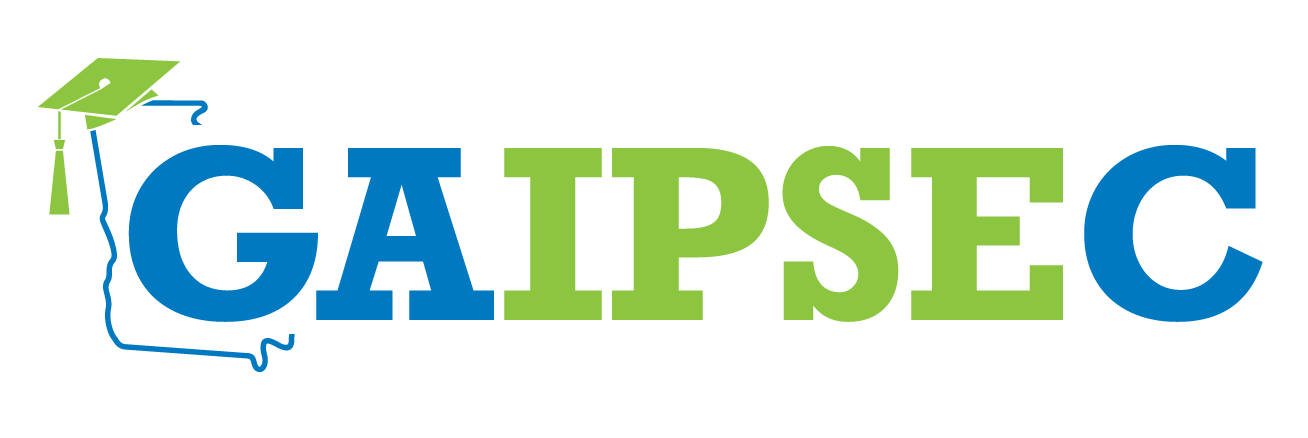Davis is the program director of Creating Higher Education Opportunities to Increase College Experiences (CHOICE), an inclusive certification program for students with intellectual disabilities (ID) pursuing their next steps.
Nestled in Swainsboro, Georgia, East Georgia State College has been a two-year, broad-access institution, meaning it makes college education accessible to most students. Today, the college has over 3,000 students, two additional campus locations and a new student center.
This expansion includes CHOICE. It started in 2015 with just three students. Today, CHOICE has been in existence for eight years, making it Georgia’s second oldest inclusive post-secondary education program following Kennesaw State University’s Academy for Inclusive Learning and Social Growth program.
Davis had retired from the public school system, after over 30 years of service. At the time, IPSE programs were increasing, and a colleague called Davis in to see the plan for CHOICE. “I cried,” she remembers. “They were happy tears because that was the next step for the students that were graduating. I saw so many of them that this program could work for; it would bring new life to them.”
Making the Right CHOICE
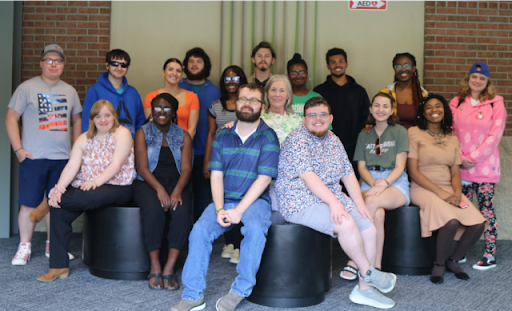
Since it began, CHOICE has served 85 students, nine of which graduated in May 2023. The program has been designated by the US Department of Education (DOE) as a Comprehensive Transition and Postsecondary (CTP) Program. To be recognized by the DOE under federal law, CTP programs are required to meet a level of rigor, and they must be at least 50 percent inclusive. Davis says students in the CHOICE program spend approximately 80 percent of their time in inclusive settings. CTP status also allows students to apply for federal financial aid in the form of PELL Grants to attend. The first semester of college is an adjustment for any student, and CHOICE uses this opportunity to allow its students to adapt to change and take advantage of opportunities. Mostly, the students are in charge of their own process of learning.
“These kids breathe, live, walk and talk this campus,” says Davis. “They are in the mix and they are included in everything. Their energy is infectious – the faculty, staff, and other students see their joy and want it. They spend time talking to instructors and ask questions like any other students would. That’s the beauty of them being on campus,” she explained. “They are learning. They are going to try things and mistakes will be made, but successes will follow. By October, there is structure and settling. They know what we are going to do, and they know what they’re going to do. They understand because we talk about it.”
 Lena Nwakudu, M. ED., a CHOICE Academic Instructor says when students first come into the program, they are a little hesitant at first because many times this is their first time away from home. She also said the students are learning their independence, making their own decisions and they may look to the staff for various support. The undercurrent of all things at CHOICE is communication. Nwakudu focuses on the idea that they encourage their students to “lose the shyness” and learn to talk and advocate for themselves.
Lena Nwakudu, M. ED., a CHOICE Academic Instructor says when students first come into the program, they are a little hesitant at first because many times this is their first time away from home. She also said the students are learning their independence, making their own decisions and they may look to the staff for various support. The undercurrent of all things at CHOICE is communication. Nwakudu focuses on the idea that they encourage their students to “lose the shyness” and learn to talk and advocate for themselves.
“We work with life skills, social skills, and the first thing we stress is communication. They need to communicate with everyone, be it with their classmates, their professors or even us at the CHOICE program. Communication is the key,” explains Nwakudu. “If I can’t talk to you or someone can’t understand what you’re doing, then you’re not going to go anywhere. Once they get comfortable with communicating, they learn to be more expressive. Then, they can venture into other things that they might have wanted to do,” she added, emphasizing that at CHOICE, the staff focuses on letting students lead their experience.
“We invite the students into the process of learning,” adds Davis. “I think that’s one of the most beautiful things that we do, is that authentic learning. They’re exploring and we are exploring because we don’t know them yet. We share those things with them, and we talk about our mistakes, and we talk about some of the things, the bumps in the roads that we have and how we got around them or got over them. I tell the staff every October, ‘you’ll see a difference.’ And we do. And I think it’s that consistent structure.”
It’s a collaborative experience that allows the students to lean into their independence. Outside of academics, college allows students to tap into soft skills, or life skills. One student spoke about his own experiences in the CHOICE program.

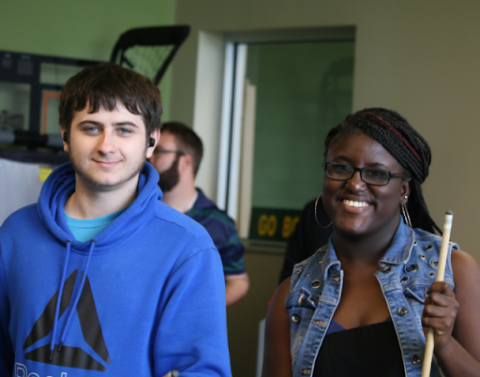
“Well, it’s really not a lot different from normal college,” says Austin Trevor Rich, who graduated from CHOICE this past May. “There were quite a few things, additional things that helped in building professional skills that I didn’t get a chance to get through in my personal life. There were also multiple events which led to us meeting others across the campus and again, improving various skills.”
The Importance of Peer Mentors
Along with classes, students participate in study sessions with older students, mentors, and teaching staff to get the help they need for their classes. Like almost all IPSE programs, peer mentors are an integral part of the experience for students in CHOICE. According to an article in the American Journal of Occupational Therapy, peer mentors play a vital role in ensuring students with ID are successful in building campus life skills, social capital and self-determination.
“Peer mentors are, I think, the most important thing to a student’s experience on campus,” reflects Davis. “It’s easier for a new college student to speak to another new college student because they go through the same issues. I think it is that needle and thread thing that binds the program because we really have had some great mentors who are dedicated. They know when they apply for the CHOICE program, what we do, who we are, who we are serving, and they are willing to apply.”
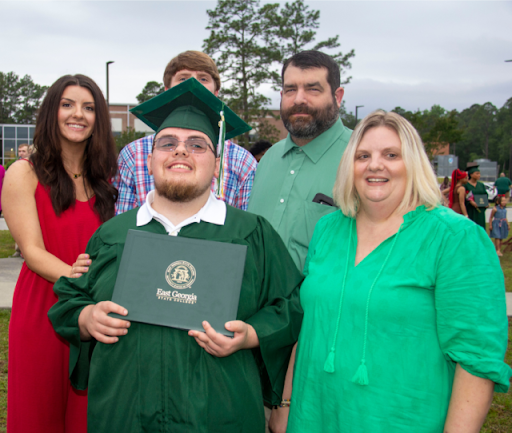
Elizabeth Colston, a peer mentor, is a sophomore at East Georgia State College and is also a sibling of a person with a disability. Her brother, John Wesley, also attends college through the CHOICE program.
“I’ve seen growing up and with John Wesley too, people would baby him and coddle him,” says Colston. “But they can do everything we can do. They just may do it in a different way. I think the CHOICE Program is a really good example of that and it gets that point across. The students knew their schoolwork. They would take notes in class and then would review them. They just did things differently. And we all do things differently.”
There was an unforeseen moment when Taryn Jackson met Theresa Davis on the basketball court. Jackson was in class and Davis was there with her CHOICE students. Through a series of events, Davis asked Jackson to become a peer mentor. After that, Jackson brought in her brother, Aiden, and then sister, Alora and brother, Tate. You can call it a family affair.
Each peer mentor has a different experience. “For me, I have a bunch of the students that were in my sociology class with me, so I would often-times go over notes and reiterate lessons for them and kind of help them understand things that were maybe a bit more difficult,” says Alora.
For Tate, being a peer mentor has been helpful to him as well. “I was a freshman when I started as a peer mentor, and they’re freshmen too,” he says. “So, we were both coming in together to help them out and make friends. We help with the stuff that they might struggle with, and it makes you realize that it helps you too.”
The Art of Letting Go
Like any parent who is preparing to send their child to college, the moment, however exciting, is met with anxiety and lessons on learning to let go. CHOICE’s structure and new experience has also provided parents a learning curve on adapting to change at the same time as their students.
“I think that’s hard for us as parents because our natural urge is to protect,” says Amanda Locke, whose daughter Marie attends CHOICE. “And that’s not just our kids with extra challenges. It’s any child, any parent. You want to bubble wrap your child. You really have to get over that.”
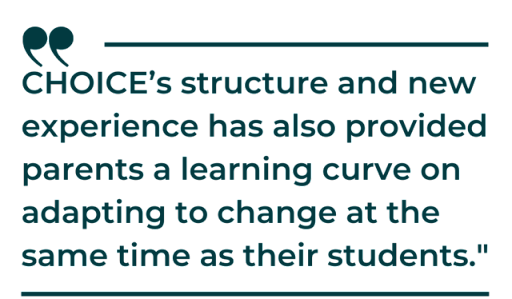
“A lot of the time when the parents come, they are apprehensive about the experience that the students are going to have,” said Darlene Jordan, Ed.S. Academic Success Facilitator. “They want to know if the students are going to get the extra help that they need in order to be successful within the program. We help them understand that the CHOICE staff is here for them and that we are going to help them do what is needed to help them to be successful within the program.”
Jordan remembers a student who needed an extra pillar of support. She recalls the student being so shy that he would not ask questions. He needed additional support to express what was going on within the class, how he was doing in the class, or what he needed help with. He needed support to ask for help. Jordan started to map out the syllabuses provided to make their classes and workloads more digestible. She said that helped the student realize everything can be mapped out and that it helped him to transform and be comfortable with college.
She went on to say that in his sophomore year, he started writing down what the assignments were on his own using the same model to be successful for that year. Jordan proudly reflects that that student graduated from the program with a high average and graduate honors.
“It’s still different though,” adds Locke, chiming in. “It’s a different setting than they’ve been in, you know? Some of our kids may have been in our district school since they were three, and that’s a long time in one very familiar spot. It is definitely joyful, but there is also this sense that you are going to someplace different.”
Parents are less nervous once they see their kids shine. One parent shared how she saw a positive change in her daughter who is in the CHOICE program.
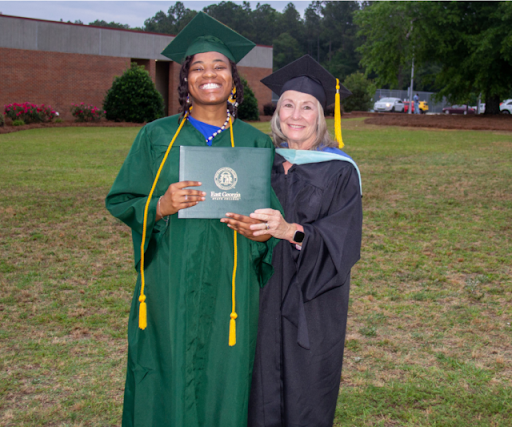
“When Rinika was in high school, she would converse with peers, but she had a select few,” says her mom, Lynette Tompkins. Rinika is a person who is deaf/hard of hearing. “Her being deaf made her shy. Here, she opened up even more, because she would come home and tell stories of, ‘We did this. And so and so is my friend and I got their phone number.’ And there was a time she wouldn’t have done that. She started opening up with the entire student body. I noticed that in her ,” said Tompkins.
Sharonda Johnson, a student at the CHOICE program, reflects on her experience. “The CHOICE program…we’re a whole huge family. It doesn’t matter what your disability may be, we have a lot of staff and teachers that are willing to go all their way to help you. And sometimes not only with their support. We students inside the program support each other and we get the job done.”
Adam Wilkes, whose daughter Denise has graduated from the CHOICE program, will now be working with the program. But in the beginning, it wasn’t so easy.
“We had an issue where she just didn’t want to come, and it was kind of a struggle to get her to keep coming,” remembers Wilkes. “Ms. Theresa and everyone, we all talked to her and said, ‘You know, you don’t have very much longer. Just fight through it. You’ll get there.’”
Denise graduated and now she will be working with Davis at CHOICE.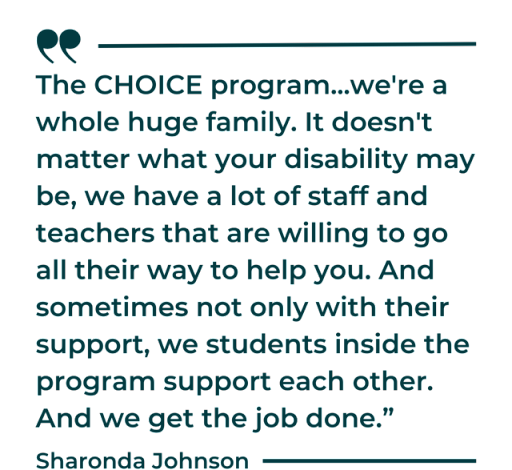
“I’m proud of my Denise,” remarks Wilkes. “She’s going to stay here with Theresa Davis and continue on helping other students through the program as well. She’s so proud of herself and we are so proud of her for everything that she’s done and accomplished.”
“We can try to protect them, but there’s a saying, ‘You don’t make the road ready for the child. You make the child ready for the road.’ And they’re not going to be ready if they haven’t learned how to pick themselves up and dust themselves off a little bit,” Locke adds. “We’re fortunate to be able to come here and to have people who understand the importance of struggle, that’s every bit as much part of the education as writing the papers or learning to speak publicly. Allowing them to do that and helping them understand failure is not the end. It’s just a step, and it can make you stronger to get to the next place.”
